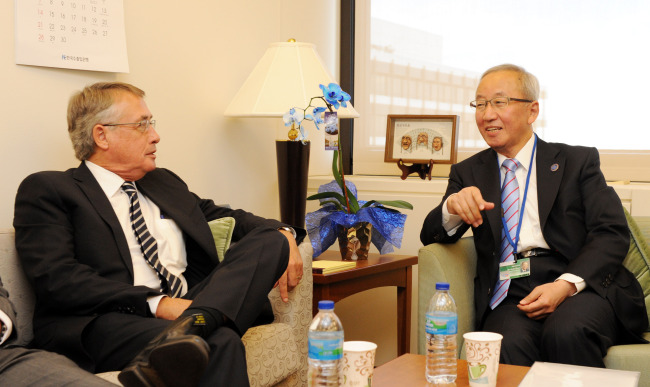Korea’s Finance Minister Hyun Oh-seok said that large Korean companies need to run their businesses in line with the incumbent administration’s economic democratization policy.
Hyun, who is also the deputy prime minister, told reporters after the Group of 20 meeting of finance leaders in Washington, D.C., on Saturday that companies that devised their management and operation plans without considering economic democratization are headed in the wrong direction.
He added that companies should accept a “consensus” that economic democratization is going to happen in Korea, saying that they will be miscalculating should they doubt for a moment that such policies, including prohibiting conglomerates’ additional cross-shareholdings, will not be introduced as a law.
 |
Deputy Prime Minister and Finance Minister Hyun Oh-seok (right) holds a bilateral meeting with Australian Treasurer Wayne Swan on global economy on the sidelines of the IMF’s International Monetary and Financial Committee meeting in Washington, D.C., over the weekend. (Ministry of Strategy and Finance) |
He continued to say that the government’s economic democratization is to promote a fair market for both conglomerates and small and medium enterprises, and its creative economy is geared toward developing an ecosystem in a market where start-ups can rechallenge and be reestablished even after failure.
The government’s supplementary budget is not enough to revive the economy, but it must take into account a variety of economic policies to achieve growth, Hyun said.
Financial leaders of the Group of 20 developed and developing economies reached an agreement to closely watch over and buffer any possible negative side effects from monetary easing by advanced economies, and also reiterated their position on market-determined exchange rates.
They stressed the need for further global policy coordination among advanced and emerging countries to spur the global economy from its slow recovery path.
The eurozone is looking to ease its tight fiscal spending, while other advanced economies such as the U.S. and Japan refrained from committing to set specific target figures to reduce their debt-to-GDP ratios.
Finance Minister Hyun Oh-seok urged advanced economies of the G20 that implemented monetary easing to start preparing for an exit strategy from their prolonged credit expansion, and called for fiscal reforms after 2016 as part of efforts to regain financial credibility.
Financial leaders also agreed that the purpose of Japan’s monetary easing should be to overcome deflation and weak private consumption, and not to target a high, competitive exchange rate.
Hyun said that it is understandable that Japan is implementing an easy money policy to revive its economy, but officials of the G20 dealt with this issue as its action has been affecting other markets.
Financial leaders are expected to convene at the next G20 meeting in St Petersburg, Russia, on Sept. 5-6.
By Park Hyong-ki (
hkp@heraldcorp.com)








